Did you know that the fashion industry is one of the largest polluters in the world? It's the second-biggest consumer of water, producing 20 percent of wastewater while also generating more greenhouse gas emissions than all international flights and maritime shipping combined. And if that's not bad enough, thousands of hectares of ancient forests are cut down yearly to make room for plantations needed to produce wood-based fabrics (i.e., rayon, modal, viscose), further adding to the deforestation problem in Indonesia and threatening our ecosystem.
As with food, buying organic matters when it comes to clothes too. Organic farming produces less water waste—saving almost 115 gallons of water when you switch to an organic t-shirt alone. Not to mention, the decreased exposure to harmful chemicals since organic clothing is free of toxic pesticides and plastics.
A majority of clothing today is made out of synthetic fibers (e.g., polyester, nylon, spandex, and acrylic), which are all forms of plastic. When we wash our clothes, plastic fibers enter our waterways further adding to the microplastic pollution of our oceans. Washing one fleece jacket can produce up to 100,000 microfibers in one wash alone; and, around 100,000 marine animals are killed each year by plastic waste, including these microfibers—a good portion of which end up back on our plates through the fish we eat, and even our table salt!
So how can we help ease the environmental impact of our clothes when we aren't the ones producing them? By being conscious of the brands we support, how much we purchase, and what we do with our clothes when we no longer want them. To help you get started, here's a list of my go-to eco-friendly brands, followed by ways you can mindfully reduce, reuse, and recycle unwanted garments.
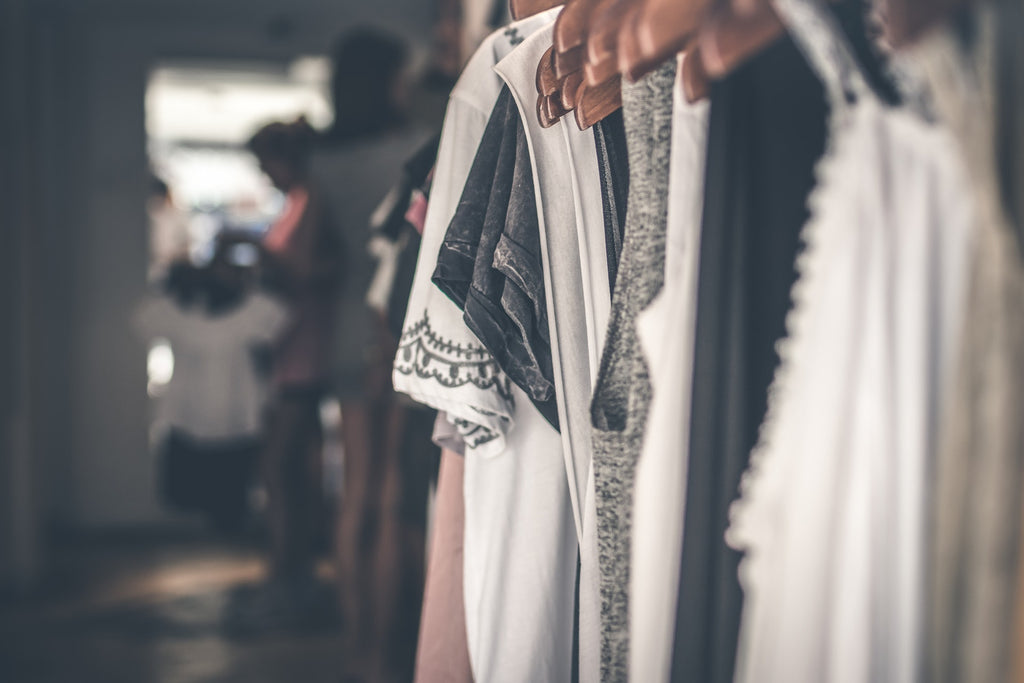
Basics
- Tentree. Tentree is a certified B-Corp that takes their commitment to sustainability to another level. For every item purchased, they plant 10 trees, with a goal to plant 1 billion trees by 2030—they’ve planted over 25 million already! From coconut buttons to cork trims, everything they sell is made using sustainable fabrics, including organic cotton, recycled polyester, hemp, Tencel, and more. And it doesn't hurt that their clothes are super comfortable and their factories are WRAP certified. Did I mention you get to choose where your trees are planted? Tip: You can also find their in-season items at REI if you want to reduce the footprint (and cost) of shipping.
- Pact. This is our go-to store for undergarments and basics. Most of their clothes are made from 100% organic cotton. All of their products clearly state their fabric content, as well as how many gallons of water were saved during production, so you don’t have to question what’s in your clothes. Their sock factory is also powered using wind energy, and they work with fair-trade certified factories in India, where a majority of organic cotton is produced. Tip: I highly recommend signing up for their emails. They run huge sales on their basics a few times a year and it’s a steal! They also have an affordable baby and kids line, and recently launched organic bedding, which we love!
- Everlane. Though currently a majority of their clothes are not necessarily made with eco-friendly materials like organic cotton, hemp, or Tencel, I wanted to include Everlane because they are a better alternative to many of the popular brands out there, and they are slowly making shifts towards greater sustainability. The thing I love about Everlane is their commitment to transparency and social responsibility (e..g, fair-trade factories, their stand against human trafficking, fair wages, etc.), with many of their garments raising awareness for causes like the 100% Human Hoodie—from which $5 of every sale are donated to support equal rights for women—or their latest Climate Collection that gives students a subscription to the New York Times so they can stay on top of the latest in climate news. On top of the social work they have already been doing, Everlane is beginning to make moves towards more sustainable materials and production practices with the recent launch of their ReNew collection, for which over 3 million plastic bottles were converted into clothes, using anywhere from 15 to 60 bottles per garment. Fortunately, it seems this is more than just a phase as Everlane has announced its goal to eliminate virgin plastic from its supply chain, packaging, offices, and stores by 2021. They’ll also be introducing a Clean Silk line this August.
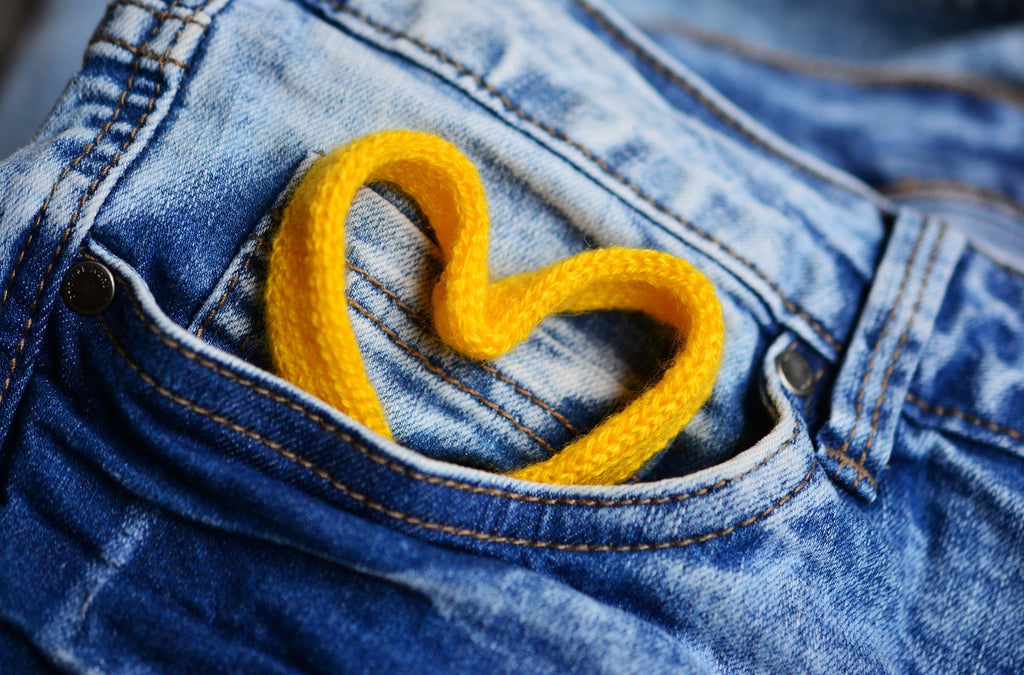
Denim
The denim industry has one of the worst ethical and environmental footprints in fashion. According to a Greenpeace report, 2 billion pairs of jeans are made every year, requiring 7,000 liters of water to produce a single pair, and using over 1.7 million tonnes of chemicals in the dyeing process, most of which enter our waterways. So when you have to buy a new pair, here are a few companies that are working hard to reduce their impact:
- DL1961. I can’t tell you how thrilled I was when I found these jeans because not only are they sustainable, they are also the first pair of jeans that are actually too long for me! I know what you’re thinking, but not to worry because they offer short and normal lengths too :) Powered by solar energy and an in-house generator, DL1961 jeans are made with ethically sourced cotton and nontoxic plant-derived dyes. Their packaging is biodegradable and 98% of water used in their production is recycled and reused, saving almost 50 million gallons of water in 2018 alone. They also donate excess fabric to FABSCRAP, a non-profit that upcycles textiles, which saved the equivalent of planting 865 trees last year. Additionally, they use a trademarked material called Refibra, which makes denim out of cotton scraps and wood pulp that would otherwise end up in a landfill. Tip: A lot of stores carry this brand so it’s easy to find them on sale, although I haven’t had to purchase a new pair in quite some time since they last long.
- Everlane. Again while Everlane isn’t using organic cotton, their LEED-Certified factory recycles 98% of its water and is powered by clean energy. To give you an idea: that’s .4 liters used after recycling compared to 1500 liters for most denim on the market. Though they aren’t using plant-based dyes either, they account for their waste by extracting and shipping it to a nearby factory to be mixed with concrete, which prevents the toxic materials from leaching into the environment. These mixtures are then converted into bricks to build affordable housing. So while they might not be organic and chemical free, at least they are doing their part to reduce the water use and toxic pollution from their production practices.
- Outerknown S.E.A. Collection. Made with 100% organic cotton, these jeans are sustainably sourced and made (they use the same factory as Everlane). Plus, they have a lifetime guarantee. You heard me! They will repair or replace jeans for free, as well as upcycle old pairs into housing insulation and other things. Their women’s jeans are available for pre-order and they also have a collection of S.E.A. pants. According to their website, S.E.A stands for Social and Environmental Accountability, which means these items “surpass the strictest standards for sustainable and ethical manufacturing.”
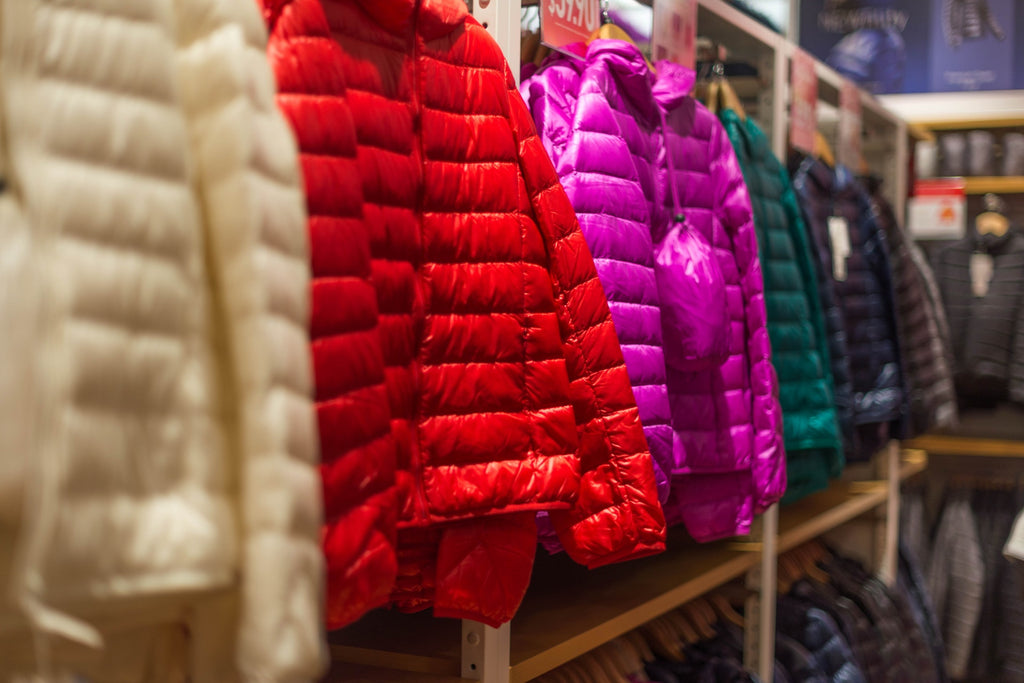
Outerwear
- Patagonia. From recycled rainwear to recycled down jackets made from recycled polyester, Patagonia has sustainable options that will keep you warm and cozy all winter. Plus their quality is worth the price and their founder is one of my favorites! He's donated over $100 million dollars to environmental nonprofits since 1985 and co-founded 1% For the Planet, which has raised over $175 million dollars for conservation efforts. Not to mention, the $10 million Patagonia is donating to grassroots groups fighting climate change—extra profits they received from Trump's tax cuts last year.
- Renew Outerwear by Everlane. Mentioned above, this line by Everlane recycled over 3 million plastic bottles into clothes. While this doesn't solve the microfibers released from clothing into our washing machines, it's still a step in the right direction.
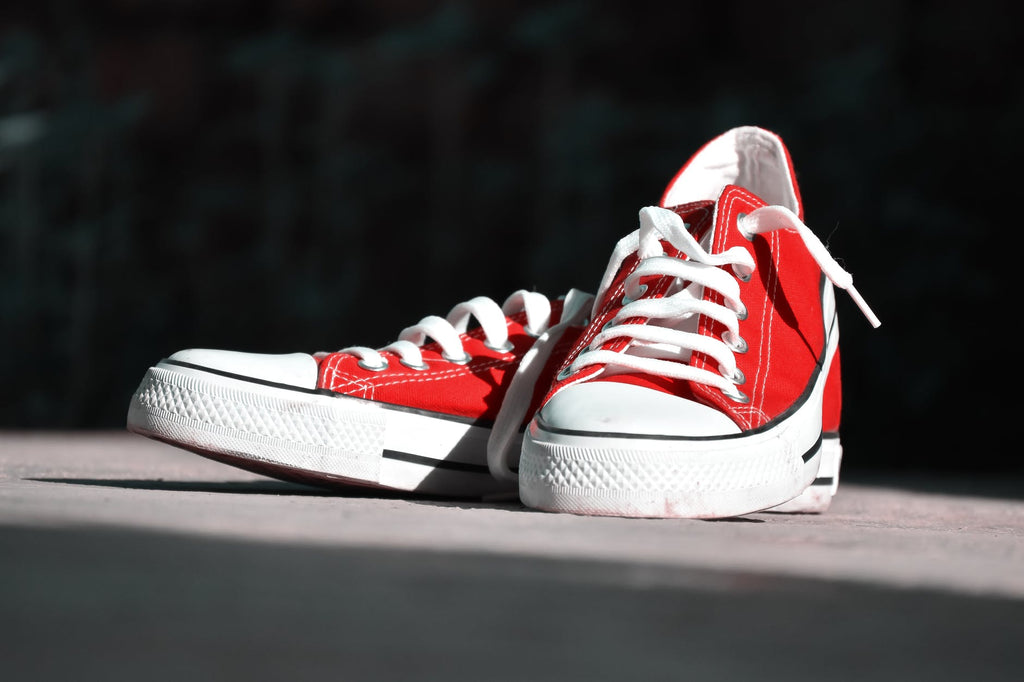
Shoes
- Veja. I've written about this brand before because they are one of my favorites! From sustainability to fair-trade to ethically-sourced materials from the Amazon, Veja is leading by example. Check out my detailed blog on them to learn more! Tip: They run a couple of big sales a year where most of their shoes are 40% off or more. I bought my first pair back in 2016 and wear them nearly every day, and they're only now starting to wear down.
- Feelgoodz. The first brand that could get me to stop buying Reefs! Their sandals are made from natural rubber and vegan leather processed with non-toxic dyes, and their designs help support local artisans.
- Allbirds Tree Collection. I have yet to try these but the more I read about them, the more I want to support! Allbirds is a certified B-Corp that focuses on sustainability from fabrics to production to packaging. Their propriety SweetFoam sole material is produced from renewable sugarcane that relies on rainwater to grow and is processed in facilities run on renewable power, making it the planet’s first carbon negative EVA polymer. Their Tree Collection is made from naturally-derived and renewable eucalyptus tree fiber, with upper soles made from sustainably harvested eucalyptus pulp and bio-based TPU eyelets created from sugar plants. They also use recycled water bottles to create their shoelaces and even castor bean oil on their insoles, which helps cut emissions from petroleum-based foam. But they don’t stop there! Their packaging is also made from 90% post-consumer recycled cardboard. If these shoes are as comfortable as they are eco-friendly, I might have a new favorite! To learn more, check out this Forbes interview with their co-founder, Tim Brown. Important Update: Unfortunately, due to Allbirds lack of transparency in regards to labor practices, I personally no longer recommend them. While they are a tough shoe to beat in terms of eco-consciousness, the lack of clarity, and poor response to how their workers are treated and paid makes them a no go for me.
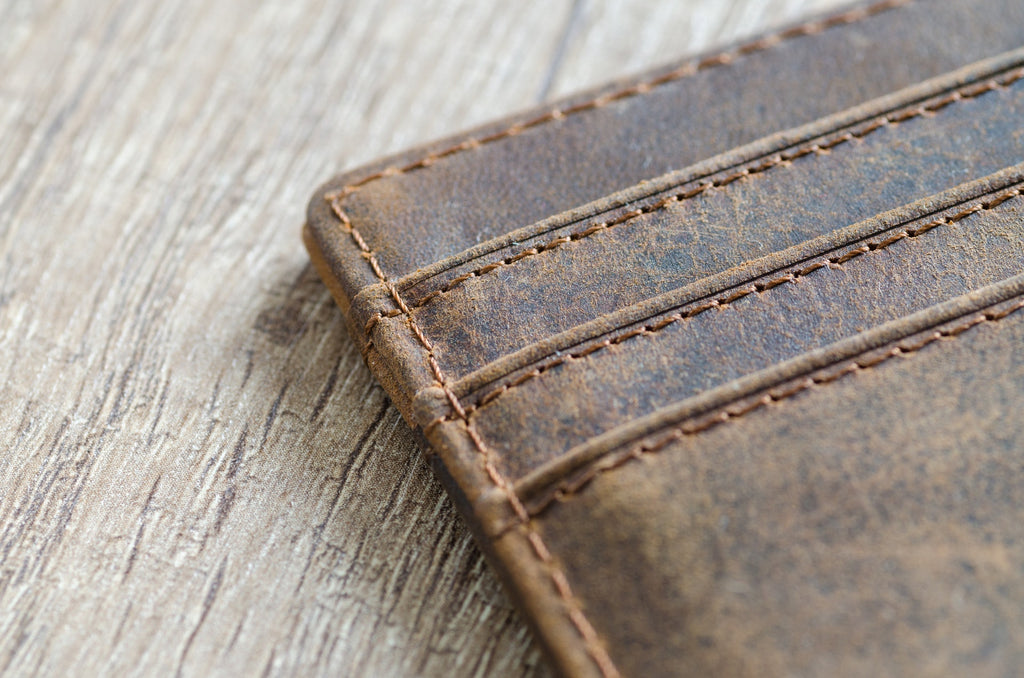
Backpacks, Totes, & Wallets
- Tentree. I have been looking for a sustainable and functional backpack forever so I was thrilled when I found the Mobius Collection by Tentree, which includes backpacks, tote bags, and duffles. All of these bags are made with 100% Repreve fiber made from recycled materials including plastic bottles and post-industrial factory waste. Everything from their buckles and trims is made from recycled materials. They also use BLOOM foam, the world’s first plant-based padding that harvests excess algae bloom, which have increased due to rising global temperatures and cause damage to ecosystems. This material recirculates clean water back into the environment and helps reduce dependence on non-renewable materials. My sweet Nani (grandmother) just bought me the Mobius Backpack, which used 31 plastic bottles to make, as a birthday gift. I’ll update on quality and functionality once it arrives! UPDATE: I absolutely LOVE this backpack, so much so that I bought the tote version as well! They are durable, have multiple pockets for easy organization, and are lightweight, making them perfect for daily use and travel.
- Corkor. If you’re looking for something that looks like leather but isn’t leather, then you’ll want to check out Corkor. FSC-Certified, all of their accessories are vegan and handmade in small batches by artisans in Portugal out of sustainably sourced cork. Their cork is obtained by removing the outer bark of the tree, which replenishes itself and can be harvested over and over again without harm. They also use non-toxic water-based inks, make products to order to avoid mass production and waste, and donate 1% of sales from every purchase to charity, which you get to choose as you checkout.
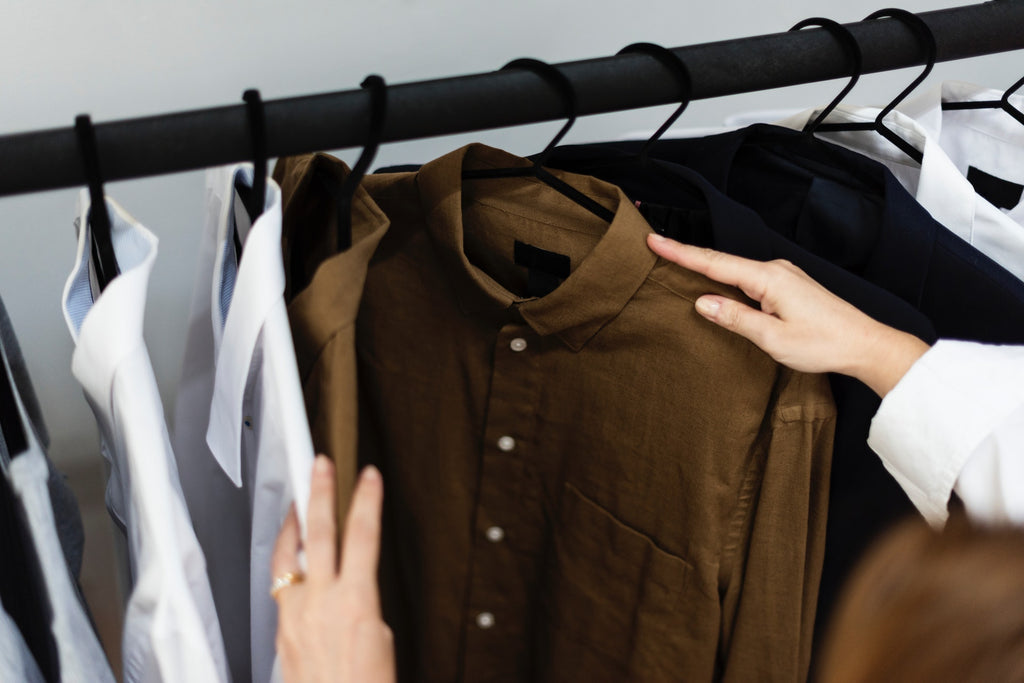
Business Casual
I hardly wear business clothes anymore but wanted to share a couple here for anyone looking for sustainable alternatives. I based these recommendations off of fabrics used, packaging, certifications, as well as price point. You’d be surprised how many brands are charging hundreds of dollars for clothes that aren't truly eco-friendly. The only downside to both of these brands is that they are located in Europe, so the carbon footprint of shipping has to be factored into the equation. I would love comments on these companies if anyone decides to try, or has tried, them!
- Armed Angels. This company takes sustainability so seriously that even their packaging is made out of grass, which creates 75% less carbon dioxide emissions than wood, and requires a lot less water and energy to produce. All of their fabrics are sustainable including organic + fair-trade cotton, recycled plastic, Ecovero lenzing, organic linen, and Tencel—made from wood pulp. Every product sold clearly states exactly what it's made of so there's no guessing involved.
- Thought. Thought clothing also uses organic and recyclable fabrics in all of their products including organic cotton, recycled polyester and rayon, and hemp. They're also mindful of their carbon footprint when it comes to sourcing these materials, as well as in their production and shipping practices. It's also clearly stated what each garment is made out of so you know exactly what you're getting. Tip: Their sizes tend to run bigger so I would size down.
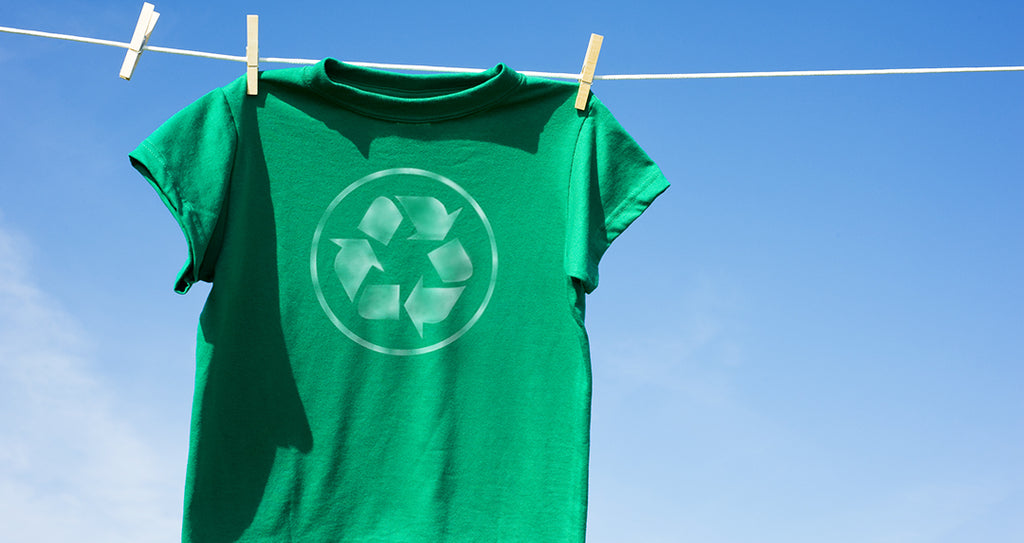
Reduce! Reuse! Recycle!
A recent study by the Ellen McArthur Foundation found that one garbage truck of textiles is wasted every second, with 92 million tons of solid waste dumped in landfills every year. So until large fashion brands take responsibility and produce less, it's up to us to be conscious consumers. Here are some more ways you can ease your impact!
REDUCE- Purchase Consciously. Next time you’ve got an event that you’ll buy that dress you know you’ll never wear again, why not rent instead? Guys rent tuxedos all the time so why can’t we? Here are some great options for dress and clothing rental:
- Rent the Runway. Designer dresses for every occasion and price point.
- For Days. An interesting take on zero waste, this organic t-shirt company provides a lifetime membership. How it works: you purchase an organic t-shirt for $38. When you're ready for a new one, you swap it out with another item for $8 and your old shirt gets recycled into a new one. Pretty neat!
- Opt for Longevity. Rather than falling into the trap of fast fashion, opt for buying clothes that you truly love and can see yourself wearing for years to come.
- Filter Your Laundry. There are a few options out there to help reduce microfiber pollution from your washing machine, including Coral Ball, Guppy Friend, and Lint LUV filter.
- Pass It On. Share old clothes with younger siblings or cousins. I’m sure they’ll love what you’re tired of!
- Swap It Out. Did somebody say wine and a new wardrobe?! Invite friends over and swap out clothes you no longer love. You’d be surprised how many beautiful things people want to get rid of!
- Resell It. If you're looking to make some money and your clothes are in good condition, try reselling them on Poshmark or threadUP.
- Upcycle! Get creative and upcycle your clothes with these 20 tips, including a reusable tote bag, t-shirt rug, and more!
- Donate It. There are many organizations that will happily accept used clothes, but it's important to make sure that they're in good condition or else they'll probably end up in a landfill. Also, it's important to note that this isn't a solution! Most organizations get so many used clothes that it's impossible for them to reuse them all, so it's vital to purchase consciously. If you have to donate, try:
- Dress for Success. Have dressy or work appropriate clothes you no longer want? Donate them to this non-profit that empowers women to gain economic independence by providing development tools, professional attire, and a supportive network.
- Donation Town. Find a charity that will pick up your donations for free.
- Soles4Souls. Nonprofit that recycles and donates shoes and helps provide individuals the opportunity to start a small business.
- Bra Recyclers. A for-profit organization that reuses, repurposes, or recycles bras and provides social benefits to women escaping drug violence and human trafficking.
- Patagonia. They'll take back any Patagonia clothing and recycle or reuse it.
- Clothes the Loop - Northface. Take back any used clothes to a participating North Face location to be recycled and receive $10 off your next purchase!
- SMART. Locate textile recyclers near you.
Remember, buying an organic t-shirt alone saves hundreds of gallons of water, so if we all try to follow even one suggestion on this eco-friendly guide, it can have a far greater impact than we think!
Love + Light,
Smita :)
